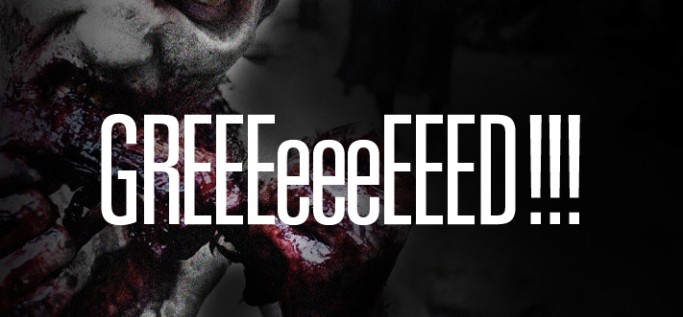
Attack of the Profit Zombies
In the spirit of Halloween, I can’t help but observe that we are on the edge of a real-life zombie apocalypse. Okay, so maybe we aren’t technically running for our lives from the undead and arming ourselves with axes and shotguns. But for many entrepreneurs and start-ups, entering the world of business means having to survive in a profit-only world that is the result of base instinct and greed.
How can we survive?
Do we join the culture of profit at all costs to practice business as usual? Or do we take a stand and fight with nothing left to lose? I say neither join nor fight. I say, change. Change the game. Find an antidote and return the universe to a model of innovation and abundance.
But as we’ve learned from most good horror tales, finding the antidote usually means isolating the cause of the virus.
In the 70s, influential economist and Nobel Prize winner, Milton Friedman talked about creating profit and shareholder value as the only real purpose of a business. Social responsibility was for universities, politics, and charity. Building purpose was distracting and unnecessary.
And so greed became good.
Business leaders were ruthless and understood that it was about survival of the fittest at all cost. For a time, this worked and the dollars rolled in.
But the profit zombies have proven to be unsustainable, even for their own cause. In an ironic twist of fate, the intense and unrelenting focus on accumulation is what is actually depriving us of our resources, and on a deeper level, our sense of self. Because there is no sustainability and abundance in a system where only the virus profits and the human being becomes a mindless host.
Given the mindless quality of a zombie, I think that the antidote lies in a consciousness about why we do what we do. Conscious capitalism leads to purposeful profit.
Purpose and profit were not always separate.
Back in 1913, Henry Ford triggered an uproar by suddenly doubling his workers’ wages to $5 a day. Most industry analysts at the time thought the decision to give an unforced pay raise was unnecessary because there was no shortage of workers willing to work for the lower wage. But Ford was a visionary and a capitalist. He understood that in order to increase productivity and eliminate costly turnover, he had to pay attention to the people. Despite sharply raising costs for all materials over the next few years, Ford was able to produce more Model T’s in a shorter time, sell them cheaper, and make a larger profit on each car than they did before.
He profited from purpose because he understood their correlation to each other.
Finding the antidote to business as usual.
Purpose is the antidote that can return sustainability to a profit generation. In purpose, we don’t eat each other’s brains. We grow new brains. We grow new resources.
ChangeMakers are the antidote to business as usual because they don’t only think of survival. They think of new ways to change the current culture because they have the insight to see that the traditional “profit at all cost” mindset is no longer working. The good news for humanity is that whoever of us that owns a business card, has access to this antidote.
Within a business environment that has fostered the zombie apocalypse of our times, we can choose to join the mind-numbing game and lose ourselves. Or we can turn our back on the game and lose others.
Or we can choose to rediscover purpose in the pursuit of abundant profit and save the world.
Written by,
Alyssa Sy de Jesus
Did you like this article?
Want to read more about good overcoming evil? Subscribe here.

TEDxVictoria talk “Heretics Wanted” useses “zombie economy” metaphor to look at ways we are all part of creating harm through our money: http://www.youtube.com/watch?v=HV-nP7uvdTM